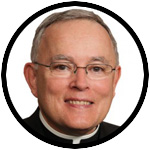
Archbishop Charles Chaput, O.F.M. Cap.
First in a series.
***
In October this year, bishops from around the world will gather in Rome for a synod. The theme of their discussions is “Young People, the Faith, and Vocational Discernment.” As a member completing his term on the Synod of Bishops’ permanent council, I’ll have the privilege of taking part in the conversation.
Plenty of social data already exists on the views and circumstances of young people, ages 16-29. But it’s also important to hear directly from real persons. So to prepare for the synod over the next four months, I’ll be handing over my regular column on an occasional basis to young people and others experienced in the work of youth and young adult ministry, so they can voice their thoughts in this space.
Regina Luczyszyn, 26, is a 2018 graduate of Temple University Law School. She and her fiancé will marry in October. It’s a pleasure this week to share her comments:
[hotblock]
Young people today face a world of confusion. In that storm of conflicting ideas, the Catholic Church serves as a lighthouse – a beacon of love, mercy, and truth. However, finding Christ in the darkness isn’t always an easy journey. It can be filled with heartache. So, what can the Church do to help us on our journey? Jesus Christ gave us the answer by showing us the importance of mentorship and discipleship – a model the Church needs to revive if she expects young adults to follow Christ.
I like to imagine these mentors as navigators guiding us safely to the lighthouse. Priests, religious brothers and sisters, and lay people can all serve as mentors. But they need to be grounded faithfully in the truth and the authentic way of Jesus Christ so as to not lead people even further astray.
Many of us have been raised in broken homes affected by addiction and divorce. We do not understand the cross God has given us to bear, and as a result we’re often crippled in our spirit and actions by the pain.
I’ve especially noticed a significant lack of mentorship for those trying to live Jesus’ radical call to chastity as a single, dating, engaged, or married person. There has been no one to show me how to do this. My boyfriend at the time (now my fiancé) and I struggled bitterly with this teaching. Often, we fought over the meaning of chastity. What affections went too far? How do we actually live this teaching with any sense of joy? Whom do we talk to for experienced counsel and not just impersonal answers? How do we make each other feel loved and pursued in a virtuous way? We needed a mentor, and no one was present to show us the way.
If the Church wants us to live pure and chaste lives, then we need an accompaniment of real personal guidance and mentorship, not just sympathy or indulgence or implicit approval for things that are wrong. Perhaps our parents were supposed to serve as our guides, but too many of us come from broken, chaotic homes. We don’t know how to love or live joyfully, we don’t know how to resolve conflicts, and most of all we don’t really know the love of Jesus Christ. While a mentor won’t be able to solve all of our problems, he or she at least will be able to remind us of God’s constant presence, and to help us through the really rough waves.
I ask the 2018 synod to consider how the Catholic Church can encourage mentorships for today’s youth and young adults. We’re so tired of feeling lost in a storm with no one to help us find God’s light. Jesus spent three years sharing his work and life with 12 friends – strengthening them, loving them, and teaching them. Perhaps that’s a model the Church needs to once again reclaim so we can remember, in the middle of life’s confusion and storms, that Jesus is truly present if we seek him, ready to embrace us in his light and love.
PREVIOUS: Young adults say encuentro process ‘lighting a fire’ in people of faith
NEXT: Thoughts on the Synod: Becoming a Hedgehog



Share this story